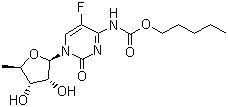Description:
Capecitabine inhibits tumor growth and metastatic recurrence after resection of human hepatocellular carcinoma (HCC) in highly metastatic nude mice model. It is a chemotherapy medication used to treat breast cancer, gastric cancer and colorectal cancer.
- Molecular Weight: 359.35
- Molecular Formula: C15H22FN3O6
Purity: ≥98% by HPLC
Canonical SMILES:
CCCCCOC(=O)NC1=NC(=O)N(C=C1F)C2C(C(C(O2)C)O)O
InChI:
InChI=1S/C15H22FN3O6/c1-3-4-5-6-24-15(23)18-12-9(16)7-19(14(22)17-12)13-11(21)10(20)8(2)25-13/h7-8,10-11,13,20-21H,3-6H2,1-2H3,(H,17,18,22,23)/t8-,10-,11-,13-/m1/s1
InChIKey: GAGWJHPBXLXJQN-UORFTKCHSA-N
- Boiling Point: 427.4±55.0°C (Predicted)
- Melting Point: 119-121°C
- Solubility: Soluble in Chloroform (Slightly), Methanol (Slightly)
- Appearance: White to Beige Solid
- Storage: Store at -20°C
Synonyms:
5'-Deoxy-5-fluoro-N-[(pentyloxy)carbonyl]cytidine; [1-(5-Deoxy-β-D-ribofuranosyl)-5-fluoro-1,2-dihydro-2-oxo-4-pyrimidinyl]carbamic Acid Pentyl Ester; Capecytabine; Capiibine; Captabin; Ro 09-1978; Xeloda; Pentyl 1-(5-deoxy-beta-D-ribofuranosyl)-5-fluoro-1,2-dihydro-2-oxo-4-pyrimidinecarbamate
More details are to be found on supplier website
